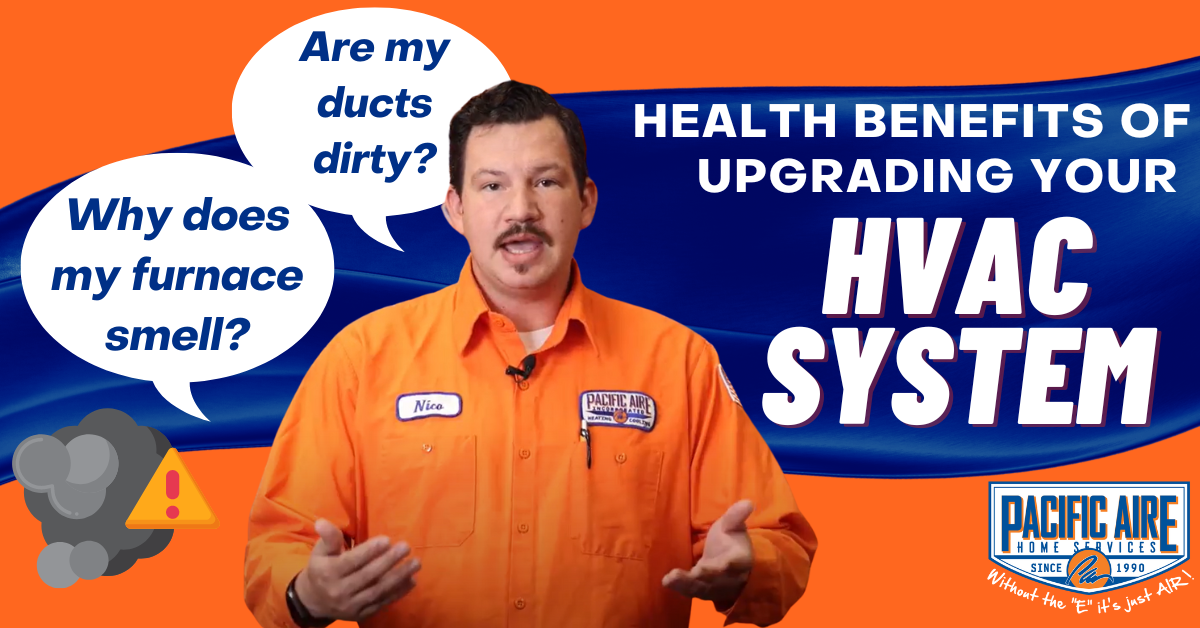Are my ducts dirty? Why does my furnace smell? What are the health benefits of upgrading my HVAC system?
Do you know what’s in your home’s air? As we go about our day-to-day lives, we face a variety of risks to our health. Whether it is driving down busy freeways, flying in planes, engaging in recreational activities, or exposure to environmental pollutants, we are faced with varying degrees of risk.
Some risks are simply unavoidable. Some we choose to accept because to do otherwise would restrict our ability to lead our lives the way we want. And some are risks we might decide to avoid if we had the opportunity to make informed choices. Indoor air pollution is one risk that you can do something about.
The EPA (Environmental Protection Agency) states that in the last several years, a growing body of scientific evidence has indicated that the air within homes and other buildings can be more polluted than the outdoor air in even the largest and most industrialized cities. The first thing that springs to mind when you hear the term “air pollution” is outdoor areas. An alarming statistic from the EPA shows that indoor concentrations of some pollutants are often 2 to 5 times higher than outdoors.
Other research indicates that people spend approximately 90 percent of their time indoors. Thus, for many people, the risks to health may be greater due to exposure to air pollution indoors than outdoors. In addition, people who may be exposed to indoor air pollutants for the longest periods of time are often those most susceptible to the effects of indoor air pollution.
Such groups include the young, the elderly, the chronically ill, and especially those suffering from respiratory or cardiovascular disease.Your air conditioner is the filter for your house and is critical in ventilating and controlling the temperature of your home. Dirty parts in your HVAC system can spread contaminants like pollen, pet dander and dust through your home. This can trigger asthma or allergy symptoms, and that can lead to sore throats, rashes, and eye irritation.
How Indoor Air Quality Affects Your Health
Asthma – It is a respiratory disorder caused by an inflammatory response to various environmental triggers. Poor indoor air is a breeding ground for dust mites and mold, leading to asthma attacks.
Allergies– If you wake up with a cough, it could be due to allergies. The air in your home is probably not as clean as you’d like it to be. We tend to associate allergies like hay fever and rhinitis with being outdoors, so we view our homes as safe spaces where we can escape from pollutants. Sniffles and runny noses can actually be worsened by poor indoor air quality.
Sleep – High levels of volatile organic compounds (VOCs) can disrupt your sleep because of headaches, asthma, allergies, and breathing problems.
Mental Health – Studies have shown that indoor air pollution can affect mental health. Poor air quality has been linked to depression, anxiety, and neurological disorders.
Eye and nose irritation – Your eyes and nose serve as indicators of indoor air quality. Your eyes may sting and your nose may burn from exposure to some indoor pollutants. There are times that the furnace smells like burning.
Where Do You Start When Trying To Improve Indoor Air Quality?
A great place to start is with our 20-point Pacific Aire Tune-Up. This includes a full inspection of your system, ducts, and insulation as well as a brand-new filter. That brand new clean air filter is important because a dirty filter can block the airflow in your ductwork and force your system to work harder not only shortening its life but also spreading dust and bacteria through your home.
Mayo Clinic Asthma Action Plan, calls for making sure your AC is up and running properly! For good reason: Whether it’s fumes, dirty air, cleaning chemicals, or expired milk, air conditioning helps keep those odors and fumes at bay.
We’ll help you say goodbye to the unpleasant odor, stale fumes, smoke smell from the furnace, and other suffocating gases inside the house that have serious effects on our health. If you do have these smells in your home, they are indications of poor indoor air quality. Experts say that bad smells also indicate the presence of chemically active particles or air contaminants in your home. While they may not fatal, they have a grave impact on your respiration.
With a new Pacific Aire HVAC unit, ductwork, or full insulation makeover, you can say hello to better sleep, an improved immune system, and overall healthier home.


